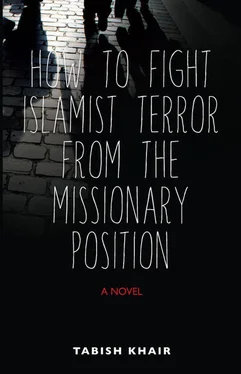Ravi looked at me and said: “Claus?” He was right.
We had all received invitations from the two Clauses and Pernille: they had planned an early Christmas lunch—in November. The lunch was their attempt to broadcast their new status, and the fact that it was acceptable to everyone concerned.
It was obviously not acceptable to Karim.
Jul—Christmas—starts sometime around mid-November in Denmark, when the shops and streets get decked out for the season and a trace of frenzy can be detected in the activities of shoppers. That is also when the first julefrokosts—Christmas lunches, which are often actually dinners—are organized. All offices and institutes have at least one, and then there are those thrown by friends and family members, some of which have had the same patterns and participants for decades. When I first moved to Denmark, where places like Pakistan are considered traditional, I was surprised by how many traditions structured, sometimes rigidly, the lifestyle of the Danish middle classes. The Pakistani middle classes have nothing comparable, and neither—it seems to me—do the English middle classes.
Even people like the Clauses, who in many ways were as alternative as one could be in Denmark, participated in traditions like that of the annual julefrokost. And this year, they participated even earlier than usual. Their julefrokost was fixed for a Friday in early November. At first, I thought that it was due to their impatience to demonstrate their new status. I realized later that there were other factors: Great and Little Claus had taken three months off from their jobs and were going to work for an NGO in Kenya around mid-November. Pernille was to visit them with the girls for Christmas. Hence, the early julefrokost.
Ravi had been trying his best to make Karim attend the julefrokost. Karim had refused adamantly. I doubt that he would have gone anyway: consumption at julefrokosts can be tallied more in liters than in grams. But Ravi thought Karim’s refusal had to do simply with his homophobia. That Thursday, as we had dinner together, Ravi even tried one of his maverick subterfuges: he suggested to Karim that the Clauses were not really gay; they were just pretending to be so in order to ease matters between Great Claus and his family.
For a moment, I thought Ravi’s gambit would work. Karim took it seriously. He paused plying the mutton (halal) biryani Ravi had cooked splendidly in a bid to mellow Karim, and dangled his spoon in thought. Karim took everything more or less seriously. But then he shook his head and his beard.
“No, Ravi Bhai,” he replied. “It is not what they are but what they have told me that matters. Only Allah can see into the hearts of men; we have to go by their words. They did not have to tell me anything. But now that I know what they claim to be, I have to do what my Allah wants me to…”
“How the hell do you know what Allah wants you to do?” I could not help blurting out, though Ravi tried to hush me. That objection had been bottled up in me all the months we had known Karim; it had to come out some day.
“It is all in the Quran,” Karim replied, suddenly on Muslim-automatic, at least to my mind. It’s the kind of non-argument that frustrates me: a stubbornness that denies all evidence to the contrary, entire histories of not just textual exegesis but even Quranic commentaries. I could not let it drop.
“You know, Karim Bhai, that the Quran is written in a dialect no one has spoken for centuries or fully understands; that it contains unclear and even contradictory injunctions. How can anyone know exactly what that book means, even if it is the word of Allah?”
Karim looked at me steadily.
“That is where we differ,” he said.
“Not just there,” I added. “You probably believe in hell too…”
“Yes, I do. Don’t you?” I think my antagonism had made Karim take more adamant a stand on his faith than he usually did.
“If I had to choose, I might believe in heaven. The heaven we make in our minds, through our knowledge of what is right and wrong. But hell, Karim Bhai? Like in burning flames, like in being punished for your sins and wickedness…” I scoffed.
Karim Bhai ignored me. He turned to Ravi, probably expecting him to be more sympathetic, and said, “I am the first person in my family to get a postgraduate degree. I did not study in the kind of schools and colleges you went to; my education has not taken me too far, but it has brought me here. I have not seen as much of the world as you have. But I have seen the good suffer and the righteous forsaken. I have seen selfishness and wickedness triumph in this world. Surely there must be hell and heaven, Ravi Bhai, for otherwise wickedness triumphs for eternity too. The poor and weak in this world lose forever… Surely there has to be a hell along with a heaven!”
“Perhaps we bear our own hell and heaven, Karim Bhai,” Ravi rejoined kindly.
“Is that enough? Is it enough for the victims?” Karim asked. Even I thought that it was a question born of curiosity, not argumentation.
“Believe me, Karim Bhai,” said Ravi, “it is worse.” Then he left the table, dumping the biryani left in his plate in the garbage bin and putting his glass and plate in the dishwasher, as he always did. It was abrupt, even for Ravi. I thought he was just closing the discussion, preempting an argument between Karim and me. I have thought about it since, and now I feel that he had other, personal, reasons. Perhaps Karim Bhai was right: each heaven comes conjoined with a hell. Including the heaven of full glasses of love…
By the evening of the julefrokost thrown by the Clauses, we had given up on recruiting Karim. Ms. Marx was out too. She did not know the Clauses and you do not turn up with uninvited guests in Denmark, not even at a party thrown by two liberated gay men and an understanding ex-wife. Lena had met them a couple of times—and, as Little Claus had joined her band of admirers, she had been sent a separate invitation too. I had expected her to come, but just as we were leaving, Ravi informed me—I ought to have guessed from the slightly inferior aftershave he had splashed on—that Lena would not be able to make it. This did not surprise me. She always had a full calendar and I knew that she was practicing for a gig with her jazz band.
Little Claus had a large suburban house off Virupvej, not very far from Hjortshøj. It had obviously been a farmhouse in the past; fields stretched out behind it. What struck me first about the house was the playground appended to a side plot: a sandbox with a tree house, a large swing, and a slide next to it. For a moment I thought that Little Claus, like Great Claus, had fathered and reared a family before exiting the closet. But Ravi, whose internal aunts were already remarkably well-informed, corrected me. The playground had been constructed for Great Claus’s daughters, about fifteen years ago, when Little Claus purchased the property. By then, the Clauses had already been lovers. It sounded romantic and sad, the way Ravi put it: this act of generosity by a lover towards the children who were the reason why his love might never be publicly acknowledged, and who were, after all, also the children of his rival.
Inside, the house was the opposite of Pernille and Great Claus’s flat. The furniture was old, unmatched and ramshackle; the paintings of no major value. I wondered if Great Claus would find it comfortable moving to such surroundings. From town to the countryside; from yuppie style to farmhouse comfort. But that evening he appeared to be happier than I had ever seen him, and completely at home.
Have I written that Lena was a trained opera artiste and that she was the lead singer in a jazz band? If I have, perhaps I need to define those two facts a bit further. Lena had taken lessons in opera singing: she came from a musical family and her father had started sending her to these lessons from the age of five. But at the age of twenty or so, it had become evident to all that she did not have a future in opera. She had tone and balance and near- perfect pitch; she learned everything perfectly. But she lacked volume, both in person—she was delicately built—and in her voice.
Читать дальше












